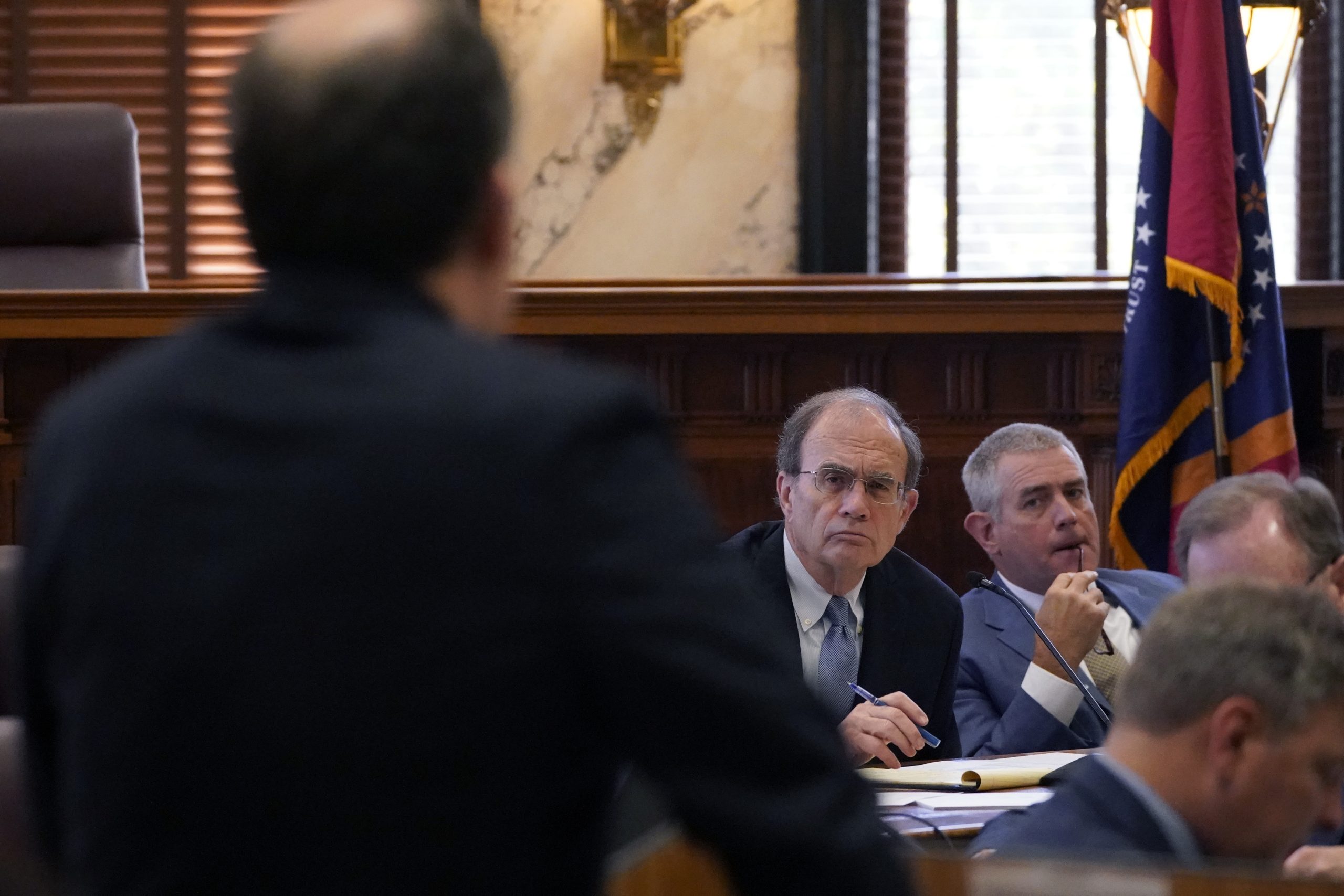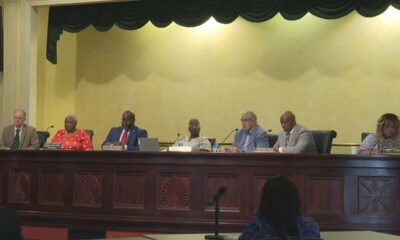Mississippi Today
Tables turned with Gunn, Hosemann on state revenue estimate

Tables turned with Gunn, Hosemann on state revenue estimate
Note: This analysis anchored Mississippi Today's weekly legislative newsletter. Subscribe to our free newsletter for exclusive access to legislative analysis and up-to-date information about what's happening under the Capitol dome.
Last year, when it was Lt. Gov. Delbert Hosemann's turn to run the Legislative Budget Committee, House Speaker Philip Gunn was anxious to raise the state's revenue estimate to grease the skids for his proposal to eliminate the income tax.
This year, Gunn's turn to run the LBC, Hosemann wants the estimate upped to help his proposal to fully fund K-12 education.
But Gunn says he does not intend to call a meeting of legislative leaders during the final days of the 2023 session to raise the revenue estimate to give lawmakers more money to budget for the upcoming fiscal year, beginning July 1.
What a difference a year makes. This time last year, Gunn was urging Hosemann to call a meeting of the Legislative Budget Committee to raise the revenue estimate.
A key difference is that last year Gunn wanted to raise the revenue estimate to ensure enough money was available to enact the income tax elimination that he and Lt. Gov. Tate Reeves coveted.
Gunn, who is not seeking re-election this year and ending his historic tenure as the first Republican speaker in the modern era, was hoping to increase the scope of the tax cut this session. But the plan was scraped after it was rejected behind closed doors by a sizable portion of his own Republican caucus.
Now Hosemann is wanting the revenue estimate raised, in part to make it easier to enact a plan to put an additional $181 million in kindergarten through 12th grade schools and achieve full funding of the Mississippi Adequate Program for only the third time since 2003. MAEP is the funding formula that provides the state's share of most of the basic needs of local school districts, such as teacher salaries, utilities and textbooks.
Gunn, who has the power to call the meeting this year, says he has no intention of doing so.
“No. We don't see any reason to adjust it (revenue) at this point,” Gunn said late last week as he headed from the House floor to a meeting.
A little background might help. The speaker and lieutenant governor alternate in chairing the 14-member Legislative Budget Committee. Hosemann chaired the panel last year. Gunn is the chairman this year.
Each year in the fall the Budget Committee along with the governor meet to decide on a revenue estimate that represents the amount of money available for the Legislature to appropriate during the upcoming session for the next fiscal year that begins on July 1.
The politicians rely heavily on the recommendation of five financial experts, including the state economist and treasurer, in making the estimate. But since the estimate is of the amount the state is going to collect during for the next fiscal year, beginning in July, it is educated guesswork at best.
The Budget Committee for years has normally re-assembled in the midst of the final days of budget negotiations between House and Senate leaders to revise the estimate. They argue the later meeting during the final days of the legislative session gives the state's financial experts an opportunity to glean more information on the outlook of revenue collections for the upcoming fiscal year.
Last year Hosemann finally called a meeting on the Friday before the weekend that was the deadline for House and Senate leaders to agree on a budget.
The legislative session is now in the final week before the deadline weekend. So, if Gunn is going to call a meeting, this is when it would occur, though he says he is not.
For a little comparison, through February of last year, seven months into the fiscal year, state revenue collections were $768.4 million or 21.5% above the estimate. During that time, the state had collected $433.3 million or 11.06% more that it collected during the same time period in the previous fiscal year.
Mississippi, like most states, has experienced and continues to experience unprecedented revenue growth. This year, revenue collections are $524.4 million or 12.4% above the estimate through February or $395.8 million or 9.1% above the amount collected the previous year.
Granted revenue collections have slowed slightly. But in past years, state leaders would have jumped at raising the estimate based on such strong collections.
And it is safe the say that if Gunn's income tax cut was on the table for consideration during the final days of the session, he also would be jumping to call a meeting to raise the estimate.
In January on Supertalk radio, Gunn was still pitching his income tax elimination plan.
“We had about $800 million more than we were even spending, and I advocated that it was time to give some of that back to the taxpayers,” he said at the time. “We are collecting more revenue from our citizens than we're even spending, let's return some of that to the taxpayers.”
This article first appeared on Mississippi Today and is republished here under a Creative Commons license.
Mississippi Today
State revenue is sluggish, but interest from federal COVID-19 money is buoying budget

Mississippi is collecting enough money to fund the current year's budget passed by the Legislature in 2023 — largely due to interest earnings on federal COVID-19 money — but tax collections remain sluggish.
April's revenue, just released by the staff of the Legislative Budget Committee, was $6.87 million or 0.65% over the estimate. But actual tax collections were $1.3 million below the estimate.
The reason total revenue for April was above the estimate is the interest earnings the state is garnering on its surplus money. For the month of April, interest earnings were $8.2 million above the estimate, thanks to the unprecedented amount of surplus money largely from federal COVID-19 spending and because of high interest rates.
Through April, the first 10 months of the fiscal year, interest earnings are $93.4 million above the estimate. Interest earnings are more than half of the total collections above the estimate of $185.8 million for the year.
For the fiscal year to date, revenue is .39% or $24.7 million above the previous year. Without interest earnings, the state would be collecting less revenue that it did the previous year.
The sluggish collections report for April was released just as the Legislature was finalizing a budget for the upcoming fiscal year, which begins July 1.
For the upcoming fiscal year, the budget, including all state support funds, will be $7.28 billion or $583.2 million more than was budgeted for the current fiscal year. That number excludes the use of surplus funds to pay for one-time construction projects throughout the state.
Kindergarten through 12th grade education will receive $246 million or 8% of the increased funds while universities will receive an additional $60.8 million or 7.5% more than they received for the current year. Community colleges will receive an additional 18% or $53 million.
The Legislature is in an unusual position of being able to make record expenditures even as revenue collections appear to be slowing, thanks, in large part to COVID-19 relief funds and other federal funds.
But many legislative leaders said during the just completed session that they will continue to monitor collections that could impact budgeting in future years if the trend continues.
For the year, state income taxes are down $131.2 million or 6.6%. That, according to state Economist Corey Miller, is attributed at least in part to the $525 million income tax cut that currently is being phased in over a four-year period. Sales tax collections are up $71.7 million or 3.2%.
This article first appeared on Mississippi Today and is republished here under a Creative Commons license.
Mississippi Today
Ex-Mississippi sheriff admits lying to the FBI
As sheriff, Terry Grassaree stoked fear into the citizens of Noxubee County by imitating his idol, wrestler “Stone Cold” Steve Austin.
On Tuesday, the 61-year-old former law enforcement officer spoke in a soft voice to District Judge Daniel P. Jordan III as he pleaded guilty to lying to the FBI when he denied that he made a jailed woman take and share sexually explicit photos and videos of herself.
He faces up to five years in prison and a $250,000 fine when he is sentenced on Aug. 7.
Assistant U.S. Attorney Kimberly Purdie told District Judge Daniel P. Jordan III that Grassaree lied to an FBI agent on July 13, 2020, about making a woman behind bars take and share nude photos and videos in exchange for favorable treatment, which included making her a jail trusty.
After she texted the photos from a contraband cell phone, he responded, “Butt is great” and “Body looks perfect.”
Standing next to his attorney, Abram Sellers of Jackson, Grassaree admitted all of what Purdie had said was true.
Grassaree was also charged with destroying evidence and wire fraud. If he had pleaded guilty to all of his charges, he could have faced up to 90 years in prison.
But his story goes far beyond what the former sheriff pleaded guilty to on Tuesday.
The Mississippi Center for Investigative Reporting at Mississippi Today and The New York Times highlighted Grassaree in its series, “Unfettered Power: Mississippi Sheriffs,” which showed how sheriffs can rule like kings in rural counties. They answer to no one and typically face little press or prosecutorial scrutiny.
The investigation published April 11, 2023, revealed that the allegations of wrongdoing against Grassaree have been far more wide-ranging and serious than his federal charges suggest. The investigation included a review of nearly two decades of lawsuit depositions and a previously undisclosed report by the Mississippi Bureau of Investigation.
At a minimum, the documents detail gross mismanagement at the Noxubee County jail in Macon that repeatedly put female inmates in harm's way. At worst, they tell the story of a sheriff who operated with impunity, even as he was accused of abusing the people in his custody, turning a blind eye to women who were raped and trying to cover it up when caught.
Over nearly two decades, as allegations mounted and Noxubee County's insurance company paid to settle lawsuits against Grassaree, state prosecutors brought no charges against him or others accused of abuses in the jail. A federal investigation dragged on for years and finally led to charges in fall 2022.
In a 2020 lawsuit, Elizabeth Layne Reed accused two deputies, Vance Phillips and Damon Clark, of coercing her into having sex. She said the men gave her a cellphone and other perks in exchange for sexual encounters inside and outside the jail. Deputies even put a sofa in her cell.
According to her lawsuit, Grassaree knew all about his deputies' “sexual contacts and shenanigans,” but the sheriff did nothing to “stop the coerced sexual relationships.”
Grassaree has previously denied any knowledge of what his deputies were doing. “Are you a boss?” he asked. “Do your employees tell you everything they do?”
Instead of intervening, the lawsuit alleged, the sheriff “sexted” her and demanded that she use the phone the deputies had given her to send him “a continuous stream of explicit videos, photographs and texts” while she was in jail. She also alleged in the lawsuit that Grassaree touched her in a “sexual manner.”
The lawsuit was settled for an undisclosed amount.
No date has been set for the sentencing of one of those deputies, Phillips, who pleaded guilty last year to bribery, which experts say could have been the perks the woman says she received. Prosecutors asked for his sentencing to be postponed “pending a resolution of another criminal matter,” an obvious reference to Grassaree's case.
The other deputy, Vance, wasn't charged. “I never coerced Reed into sex,” he wrote in his response to the lawsuit, but he never answered whether he had sex with her.
Under Mississippi law, it is a crime for officers to have sex with those behind bars, and the felony carries up to five years in prison.
Nearly two decades ago, Grassaree faced allegations of rape inside the jail that he supervised and lawsuits claiming that he covered up the episodes. At least five people, including one of his fellow deputies, accused him of beating others or choking them with a police baton.
In 2006, after Grassaree and his staff left jail cell keys hanging on a wall, male inmates opened the doors to the cell of two women inmates and raped them, according to statements the women gave to state investigators. One of the women said Grassaree pressured her to sign a false statement to cover up the crimes, according to the state police report.
About a year later, in a lawsuit, four people who had been arrested gave sworn statements accusing Grassaree of violence. Two of the people said he choked or beat them while they were in his custody. A third said he pinned her against a wall and threatened to let a male inmate rape her.
All told, at least eight men — including four deputies and Grassaree himself — have been accused of sex abuse by women inmates who were being held in the Noxubee County jail while Grassaree was in charge.
Now, 18 years after a woman first said that he pressured her to lie about being raped, the former sheriff faces possible prison time.
This article first appeared on Mississippi Today and is republished here under a Creative Commons license.
Mississippi Today
On this day in 1955
May 7, 1955

The Rev. George Lee was shot to death in Belzoni, Mississippi, after using his pulpit and his printing press to urge other Black Mississippians to vote.
He became one of the first African Americans to register to vote in the mostly Black Humphreys County. And when he helped register more than 90 other Black voters, White leaders spoke with concern over growing African-American power in the Mississippi Delta.
Lee continued his work in the face of threats and electrified crowds of thousands with his speeches, according to Jet magazine.
“Pray not for your mom and pop,” he told the crowd. “They've gone to heaven. Pray you can make it through this hell.”
Weeks later, shotgun blasts hit Lee in the face as he was driving home one night, and his Buick smashed into a house. The sheriff claimed the lead pellets found in his shattered jaw were fillings from his teeth.
Mississippi NAACP Field Secretary Medgar Evers investigated the killing, and FBI tests concluded the pellets were buckshot. No one was ever prosecuted.
More than 1,000 attended Lee's funeral, and his widow, Rosebud, decided to open the casket to show how her husband had suffered. Photographs of his body ran in Jet magazine. A few months later, Emmett Till's mother would do the same for her teenage son when he was killed.
Lee is among 40 martyrs listed on the Civil Rights Memorial in Montgomery, Alabama. A museum in Belzoni now bears his name and that of civil rights leader Fannie Lou Hamer.
This article first appeared on Mississippi Today and is republished here under a Creative Commons license.
-
SuperTalk FM5 days ago
Driver’s education set to become mandatory in Mississippi as bill passes
-
SuperTalk FM4 days ago
State approves $160M to expand Highway 7 to four lanes in Lafayette County
-
Mississippi Business7 days ago
Geartek expanding operations in Alcorn County
-
SuperTalk FM22 hours ago
Legislation outlawing ‘squatted’ vehicles in Mississippi signed into law
-
Mississippi News2 days ago
LCSO wants people aware of a scam circling the area
-
Mississippi Today3 days ago
On this day in 1917
-
Mississippi News5 days ago
Altercation at Mississippi police department leads to officer-involved shooting
-
Mississippi News2 days ago
Winston Co. Sheriff’s Office investigates shooting at Dave’s Club






































